Begegnungen25_0Tartalom
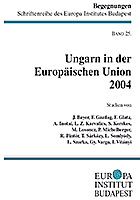 Begegnungen
Begegnungen
Schriftenreihe des Europa Institutes Budapest
Band 25.
Ungarn in der Europäischen Union
2004
Herausgegeben von
Ferenc GLATZ
Budapest 2005
Europa Institut Budapest • Zentrum für Sozialforschung der UAW
Übersetzt von Vera GÁTHY
ISBN 963 21858 9 7
ISSN 1416 3055
INHALT
Begegnungen23_0Tartalom
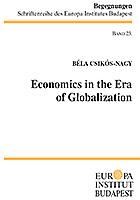 Begegnungen
Begegnungen
Schriftenreihe des Europa Institutes Budapest
Band 23.
Béla Csikós-Nagy
Economics in the Era of Globalization
Budapest 2005
Europe Institute Budapest • Social Research Center of HAS
Translated by Ildikó VÁRKONYI
Proof-read by Tamás BÁCSKAI
This book was prepared in cooperation with and supported
by the National Programme for Strategic Research
The publication was financially supported by
the Pro Renovanda Cultura Hungariae Foundation
the Aktion Österreich Ungarn Foundation
MOL Hungarian Oil Corporation
OTKA (National Scientific Research Fund)
and by the Social Research Center of the Hungarian Academy of Sciences
ISBN 963 21843 7 8
ISSN 1416 3055
CONTENTS
|
Introduction |
9 |
|
CHAPTER 1 • THE HISTORICAL ROOTS OF ECONOMICS |
|
|
CHAPTER 2 • WORLD EXPLANATION AND ECONOMICS |
61 |
|
CHAPTER 3 • THE THESES OF CLASSICAL ECONOMICS |
|
|
CHAPTER 4 • CRISIS OF CLASSICAL ECONOMICS |
|
|
CHAPTER 5 • WORLD ORDER AND ECONOMIC GLOBALIZATION |
|
|
CHAPTER 6 • THE INTEGRATION OF NATURE, SOCIETY AND THE ECONOMY |
|
|
CHAPTER 7 • THE STATE DISTRIBUTION SYSTEM |
|
|
CHAPTER 8 • ECONOMIC INTEGRATION OF STATES |
|
|
CHAPTER 9 • INTERNATIONAL PRODUCTION |
|
|
CHAPTER 10 • GLOBALIZED ENVIRONMENTAL POLICY |
|
|
CHAPTER 11 • NEW LAWS OF COMMODITY AND MONEY RELATIONS |
|
|
CHAPTER 12 • ECONOMICS OF THE TWENTY FIRST CENTURY |
|
|
Index |
557 |
Begegnungen22_0Tartalom
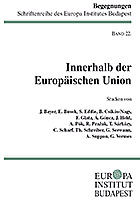 Begegnungen
Begegnungen
Schriftenreihe des Europa Institutes Budapest
Band 22.
Innerhalb der Europäischen Union
Herausgegeben von
Ferenc GLATZ
ISBN 963 21642 8 8
ISSN 1416 3055
Budapest 2004
Europa Institut Budapest
INHALT
Begegnungen21_0Tartalom
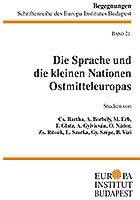 Begegnungen
Begegnungen
Schriftenreihe des Europa Institutes Budapest
Band 21.
Die Sprache und die kleinen Nationen Ostmitteleuropas
Herausgeben von
Ferenc GLATZ
Budapest 2003
Europa Institut Budapest
Übersetzt von Péter LIEBER
In Zusammenarbeit mit dem Zentrum für Sozialforschung
und dem Institut der Minderheitenforschung
der Ungarischen Akademie der Wissenschaften
Mit der finanziellen Unterstützung
der Stiftung Pro Renovanda Cultura Hungarie und Aktion Österreich Ungarn
ISBN 963 210 638 5
ISSN 1416 3055
INHALT
Begegnungen20_0Tartalom
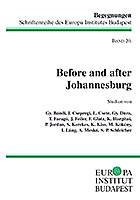 Begegnungen
Begegnungen
Schriftenreihe des Europa Institutes Budapest
Band 20.
Before and after Johannesburg
Edited by
Ferenc GLATZ
Budapest 2003
Europa Institut Budapest
Translated by Vera GÁTHY
This book was prepared in cooperation with and supported by
the Social Research Center of the Hungarian Academy of Sciences
The publication was financially supported by
the Pro Renovanda Cultura Hungariae Foundation
and by the Aktion Österreich Ungarn Foundation
ISBN 963 21063 7 7
ISSN 1416 3055
CONTENTS